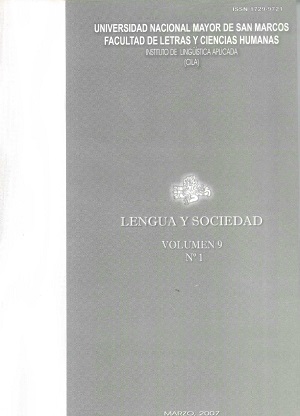Ethnic loyalty and phonetic change in Cajamarcan Quechua
DOI:
https://doi.org/10.15381/lengsoc.v9i1.26515Keywords:
Cajamarca Quechua, sonorization, deaf obstruents, change in progress, borrowing, ethnic loyaltyAbstract
This paper attempts to elucidate the problem of the retention of non-continuous sordic obstruents preceded by the homorganic nasal in borrowings from native voices in regional Spanish or in borrowings from Spanish in the Cajamarcan variety of Quechua. The interesting thing is that the terms involved in the phenomenon seem to have come into contact with Quechua in early times and that they are also of high frequency in use. However, they are not affected by the generalized process of sonorization in this variety.
This paper suggests as a plausible explanation that such terms occupy a special status since Quechua speakers differentiate between Quechua voices and those used by the dominant group. As a consequence, Americanisms and Hispanisms are not treated like native words. This fact is a reflection of the attitudes of strong attachment and loyalty to the native culture on the part of the Quechua speakers of Cajamarca.
Downloads
Published
Issue
Section
License
Copyright (c) 2007 Félix Quesada Castillo

This work is licensed under a Creative Commons Attribution 4.0 International License.
AUTHORS RETAIN THEIR RIGHTS
a. Authors retain their trade mark rights and patent, and also on any process or procedure described in the article.
b. Authors can submit to the journal Lengua y Sociedad, papers disseminated as pre-print in repositories. This should be made known in the cover letter.
c. Authors retain their right to share, copy, distribute, perform and publicly communicate their article (eg, to place their article in an institutional repository or publish it in a book), with an acknowledgment of its initial publication in the journal Lengua y Sociedad.
d. Authors retain theirs right to make a subsequent publication of their work, to use the article or any part thereof (eg a compilation of his papers, lecture notes, thesis, or a book), always indicating its initial publication in the journal Lengua y Sociedad (the originator of the work, journal, volume, number and date).



























